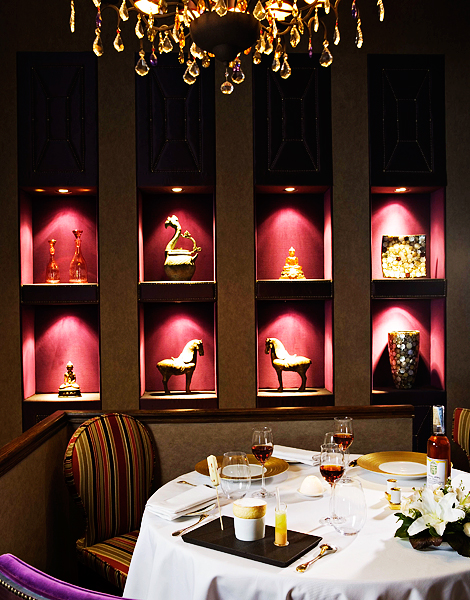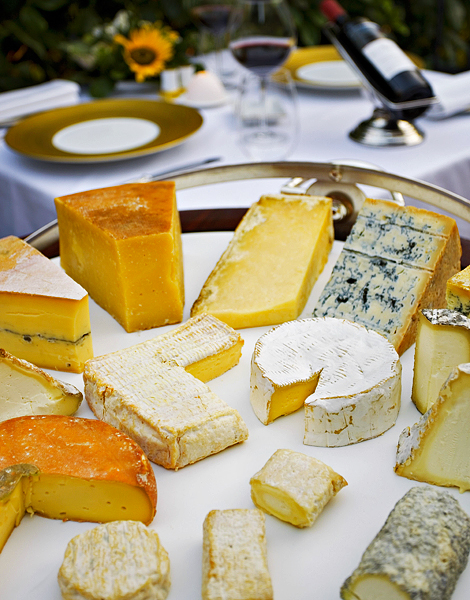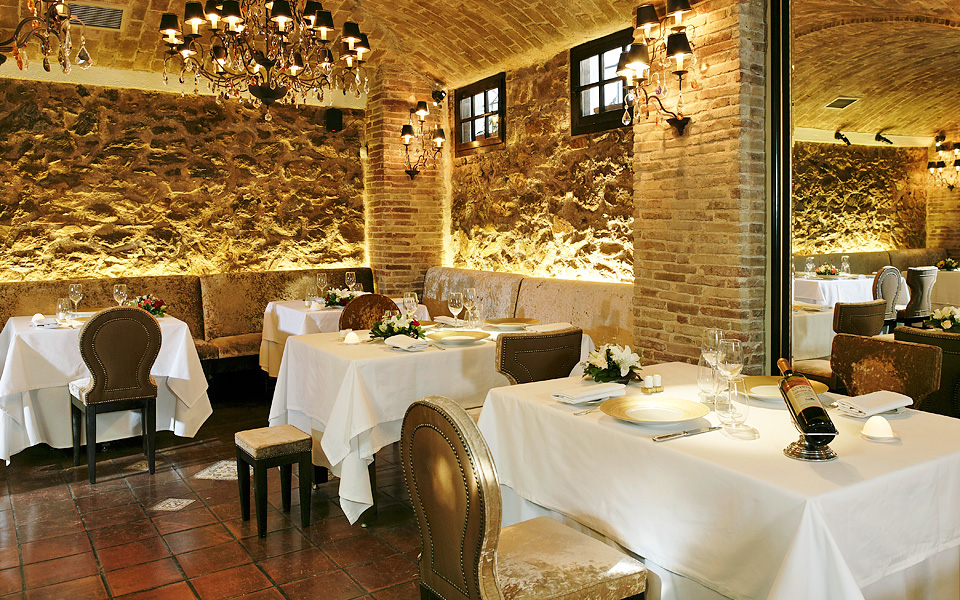Heading up the stairs leading to the entrance to Spondi restaurant one recent afternoon, there were no signs of the style and splendor I’d expected in the courtyard of this two-star Athenian restaurant. On the contrary, I found myself in a messy outdoor space covered with soil and scattered leaves.
It was difficult to imagine how the placed could be tidied up fast enough to greet the first guests of the evening in about two hours’ time.
Soon after, the sound of a straw broom could be heard sweeping over the courtyard’s tiles as three cleaners, who had worked up a sweat, emerged from behind garden plants. I asked to see Apostolos Trastelis, the restauranteur, but he had not yet arrived. As I waited, I was served an espresso and a glass of cold water. Bit by bit, the disaster-zone garden was beginning to look better. The tables were then covered with linen tablecloths, which felt truly grand as I ran my hand across one.
Upon arriving, the owner, who had not noticed me as I happened to be well concealed by a tall plant, yelled angrily after spotting a wrinkled tablecloth and some other scruffy detail I didn’t catch. I was stunned by his firmness.
Moments later, seated in his office, he tells me he used the finest linen in Greece for his tables. “Could you tell? Possibly not, as it was wrinkled. Running the restaurant is a daily battle, especially at Spondi. You need to have 360-degree vision.” he remarks.
Now that the establishment’s boss was present, I was served a larger glass of water with lots of ice. The waiters had adopted military-like obedience. We began our discussion. I felt that my questions irritated him a little. Or was he just getting worked up and enjoying the interview?
“Running the restaurant is a daily battle, especially at Spondi. You need to have 360-degree vision.”

© Vangelis Zavos
“Trastelis, who was entirely new to the restaurant business, had initially considered developing the large space as a pub.”
A PHARMACIST RESTAURATEUR
A pharmacy graduate from the University of Patras, Trastelis pursued his studies, gaining a postgraduate degree and PhD at the Athens University medical school, in an effort that accumulated into nine years of research and hard work. “Don’t imagine that it’s anything like it would be abroad. It’s a one-man show here – to the extent that you are left with inadequate time to do the essential work, which is the research,” recalls Trastelis, who ended up quitting the field. He would now be ranked an assistant or associate professor had he continued.
As a student, Trastelis took on all sorts of odd jobs. Working tirelessly night and day, he distributed flyers, stuck posters on walls around town and offered tutorials. He then made a career move by producing print advertising for the Lambrakis Press Group as a subcontractor. Trastelis formed his own company for this venture and ran it successfully before the idea of entering the food and pharmaceutical sectors began to preoccupy his mind. Both fields have traditionally offered lucrative prospects in the Greek market. He ended up going into both. In 1994, he began developing his Spondi restaurant venture. He bought a plot of land in the central Athens district of Pangrati that was connected to a house that friends of his owned. In 1995, he opened a pharmacy in Glyfada, a southern seaside suburb of Athens. The following year, he started Spondi.
Still pursuing both ventures, Trastelis wakes up at 3.30 am every day, is at the pharmacy at 8 am and then heads to the restaurant in the afternoons.
Considering Greece’s recession-linked challenges, Spondi represents a major investment. Trastelis, who was entirely new to the restaurant business, had initially considered developing the large space as a pub. “What a terrific business idea!” he yells out. The gourmet restaurant was the idea of chef Aris Tsanaklidis. “We followed his philosophy. I knew nothing about restaurants at the time,” notes the now-established restaurateur, adding that it took him 10 months to learn the job. “Gourmet quality requires associates, trained staff and a chef. Greece did not have what was needed at the time.”

“Trastelis now considers his other Michelin star-winning venture, Hytra, which is based at the Onassis Cultural Center in Athens, as his Greek restaurant.”
Trastelis ended up going on an overseas headhunt for the skills and talent demanded by his business. He brought in cooks, chefs and consultants, establishing a name for the restaurant in the years that followed. The venture gained a Michelin star, then a second, and the recognition just kept snowballing. The restaurant made it into the Relais & Chateaux, Grandes Tables du Monde and various other grand culinary brotherhoods.
As a result, Spondi gained fame abroad, as did Trastelis, who transformed his restaurant into an international attraction.
“The work that has been put into it is better respected abroad. It’s a different culture. You need to hold back here so as to avoid being pointed at,” contends the restaurateur, who believes he would have launched respective Spondi establishments abroad had the local recession not devastated the Greek economy. “The place would have fared well, easily, as it is, in London or the south of France,” he continues.
Asked why he chose French cuisine for Spondi, Trastelis insists he chose creativity: “It’s not French cuisine. It’s creative cuisine with a few Greek elements. It’s just that all creative cuisine is based on French techniques.” He’s right. Over the years, French establishments have systematically documented and researched products, their possibilities and cooking methods. “Why do you think there was such a fuss about San Sebastian in recent years? It’s located next to France, one hour away. They transferred knowledge and experience from France. Of course, they came up with a new trend in San Sebastian.”
Trastelis is quick to reject the suggestion that he is disinterested in Greek cuisine. “One thing many people do not know is that, some years ago, I opened Ruby Club, one of the first restaurants preparing Greek cuisine using refined techniques,” he notes, before referring to signature menu items prepared by Herve Pronzato, the restaurant’s chef and, at one point, chef at Spondi.
Trastelis now considers his other Michelin star-winning venture, Hytra, which is based at the Onassis Cultural Center in Athens, as his Greek restaurant. “I would like to focus more on the Greekness there, not through mere deconstruction of recipes, but transformation, to create something new,” he explains.
Asked how much of a financial loss Spondi may currently be making, Trastelis responds: “As much as I want it to. I inject money into it from other activities,” referring to his three other restaurants – Hytra, Galazia Hytra and Fuga – as well as a management and consulting firm he has established.


“I would need to lower the standards if I wanted to make a profit at Spondi,” he says, explaining that the venture compensates by providing him with the opportunity to further advance his work in the domain, be creative, add to his overall experience and thrive in the intensity involved. “I can’t do otherwise,” he says.
A good meal at Spondi requires deep pockets. “It may sound peculiar, but Spondi is probably the lowest-priced major restaurant in Europe. The average price for a meal is 120 euros, but did you know that the menu also offers 65-euro options? People don’t know that,” says Trastelis.
“Abroad, the cost per person at good restaurants can be up to 200 and 250 euros, and we may not be talking about places with a Michelin star.” Of course, incomes are higher in these countries.
The Greek entrepreneur says restaurants abroad have less state-related issues to worry about. “Do you know what they did in Spain? They realized that all the activity surrounding the culinary scene attracts tourism, rakes in revenues, and so reduced the VAT rate to six percent rather than raise it to 24 percent, as happened in Greece recently. They support restaurants. The provide students free of charge for practical experience. This is why the Spanish culinary scene is racing ahead like a horse. We just keep damaging ourselves here.”
The fact that Spondi relies on imported ingredients contributes to the venture’s high costs, he points out. “I’m not crazy to be importing things from other countries. I pay lots of money to cover transportation costs. But the ducks I import are better than the ones we have here. Unfortunately, it isn’t easy to get your message across to local producers. Domestic quality is not consistent.”
Trastelis is far from complacent. He’s continuously on the search for new producers, options and solutions. He pulls out an A3 sheet of paper from a drawer depicting a plan for a prospective Spondi vegetable garden, a 1.5-hectare plot of farming land divided into sections. Though an ambitious plan, he will strive to make it happen.
Spondi’s menu changes four times a year, in accordance with the seasons. Nothing is included on the menu unless Trastelis has endorsed it. “The point is to see how they go down in the restaurant, what kind of feedback you get from the people,” he says.
This, however, is not enough for Trastelis, who has assembled an undercover team – all friends – who enter the restaurant spontaneously, try menu selections and report back to the boss. “I’m a perfectionist. But I’m also emotional. I don’t just get the axe out and start sacking people,” he says. He employs over 100 people in his restaurants, 10 of whom are senior staff.
Asked a final question about his favorite eating place, besides Spondi, Trastelis insists there is none: “I no longer go to good restaurants. I’ve had enough. Do you know what I enjoy? A good souvlaki.”
Originally published in Kathimerini’s K Magazine
“Spondi’s menu changes four times a year, in accordance with the seasons. Nothing is included on the menu unless Trastelis has endorsed it.”












